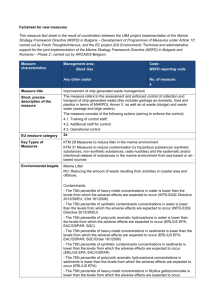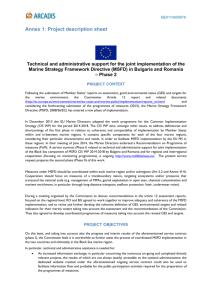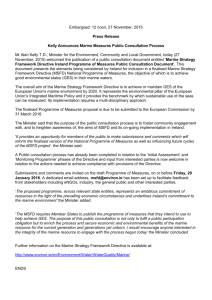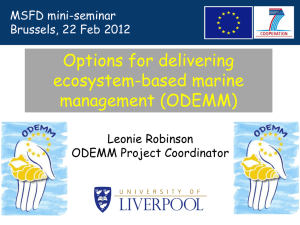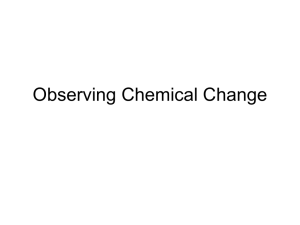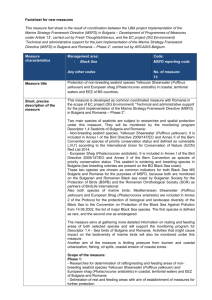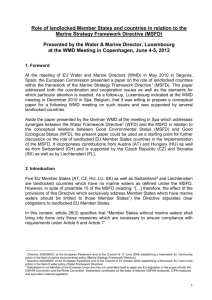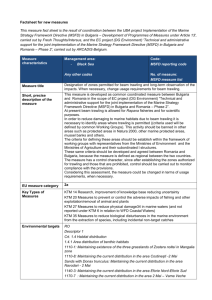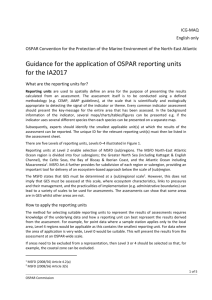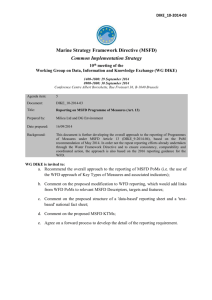Factsheet_1_FINAL3
advertisement
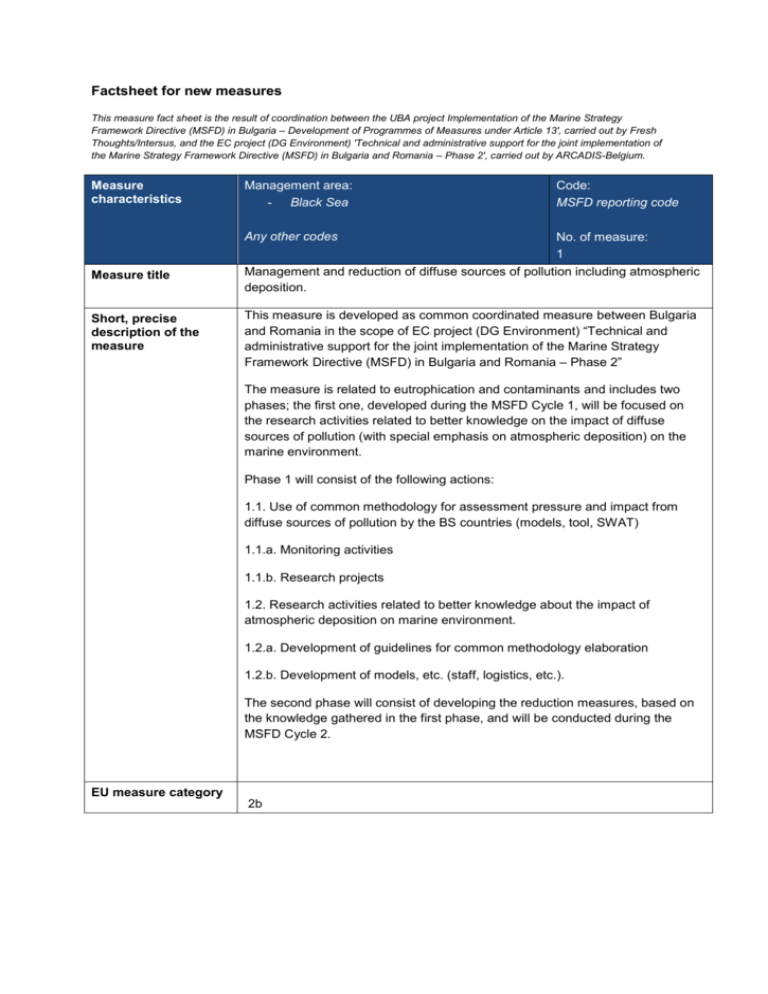
Factsheet for new measures This measure fact sheet is the result of coordination between the UBA project Implementation of the Marine Strategy Framework Directive (MSFD) in Bulgaria – Development of Programmes of Measures under Article 13', carried out by Fresh Thoughts/Intersus, and the EC project (DG Environment) 'Technical and administrative support for the joint implementation of the Marine Strategy Framework Directive (MSFD) in Bulgaria and Romania – Phase 2', carried out by ARCADIS-Belgium. Measure characteristics Management area: - Black Sea Code: MSFD reporting code Any other codes No. of measure: 1 Measure title Management and reduction of diffuse sources of pollution including atmospheric deposition. Short, precise description of the measure This measure is developed as common coordinated measure between Bulgaria and Romania in the scope of EC project (DG Environment) “Technical and administrative support for the joint implementation of the Marine Strategy Framework Directive (MSFD) in Bulgaria and Romania – Phase 2” The measure is related to eutrophication and contaminants and includes two phases; the first one, developed during the MSFD Cycle 1, will be focused on the research activities related to better knowledge on the impact of diffuse sources of pollution (with special emphasis on atmospheric deposition) on the marine environment. Phase 1 will consist of the following actions: 1.1. Use of common methodology for assessment pressure and impact from diffuse sources of pollution by the BS countries (models, tool, SWAT) 1.1.a. Monitoring activities 1.1.b. Research projects 1.2. Research activities related to better knowledge about the impact of atmospheric deposition on marine environment. 1.2.a. Development of guidelines for common methodology elaboration 1.2.b. Development of models, etc. (staff, logistics, etc.). The second phase will consist of developing the reduction measures, based on the knowledge gathered in the first phase, and will be conducted during the MSFD Cycle 2. EU measure category 2b Measure characteristics Management area: - Black Sea Code: MSFD reporting code Any other codes No. of measure: 1 Key Types of Measures Phase 1 KTM 14 Research, improvement of knowledge base reducing uncertainty (Phase 2) KTM 2 Reduce nutrient pollution from agriculture KTM 3 Reduce pesticides pollution from agriculture KTM 15 Measures for the phasing-out of emissions, discharges and losses of priority hazardous substances or for the reduction of emissions, discharges and losses of priority substances KTM 21 Measures to prevent or control the input of pollution from urban areas, transport and built infrastructure KTM 31 Measures to reduce contamination by hazardous substances (synthetic substances, non-synthetic substances, radio-nuclides) and the systematic and/or intentional release of substances in the marine environment from sea-based or air-based sources KTM 33 Measures to reduce nutrient and organic matter inputs to the marine environment from sea-based or air-based sources Environmental targets Eutrophication (state target): The 75th percentile of annual mean concentrations of nutrients in marine waters no less than target values (set out in the Romanian revised GES report under Arts. 9 and 10 of the MSFD - Table 4-14, page 130) Eutrophication (pressure target): DIP and DIN from anthropic input should be constant or decreasing, based on monitoring routine. Contaminants - The 75th percentile of heavy metal concentrations in water is lower than the levels from which the adverse effects are expected to occur (WFD-EQS/ Directive 2013/39/EU; /Ord.161/2006) - The 75th percentile of synthetic contaminants concentrations in water is lower than the levels from which the adverse effects are expected to occur (WFDEQS/ Directive 2013/39/EU) - The 75th percentile of polycyclic aromatic hydrocarbons in water is lower than the levels from which the adverse effects are expected to occur (ERL/US EPA; EAC/OSPAR; SQC) - The 75th percentile of heavy metal concentrations in sediments is lower than the levels from which the adverse effects are expected to occur (ERL/US EPA; EAC/OSPAR; SQC/Order 161/2006) - The 75th percentile of synthetic contaminants concentrations in sediments is lower than the levels from which the adverse effects are expected to occur (ERL/US EPA; EAC/OSPAR) - The 75th percentile of polycyclic aromatic hydrocarbons concentrations in sediments is lower than the levels from which the adverse effects are expected to occur (ERL/US EPA) - The 75th percentile of heavy metal concentrations in Mytilus galloprovincialis is lower than the levels from which the adverse effects are expected to occur (Commission Regulations (EC) no. 1881/2006 and 629/2008 - The 75th percentile of synthetic contaminants concentrations in Mytilus galloprovincialis is lower than the levels from which the adverse effects are Measure characteristics Management area: - Black Sea Code: MSFD reporting code Any other codes No. of measure: 1 expected to occur (EAC/OSPAR) Descriptors D5 – Eutrophication D8 – Pollutants Main pressures Nutrient and organic matter enrichment - inputs of fertilizers and other nitrogen and phosphorus-rich substances (e.g. from point and diffuse sources, including agriculture, aquaculture, atmospheric deposition), - inputs of organic matter (e.g. sewers, mariculture, riverine inputs). Contamination by hazardous substances - introduction of synthetic compounds (e.g. priority substances under Directive 2000/60/EC which are relevant for the marine environment such as pesticides, antifoulants, pharmaceuticals, resulting, for example, from losses from diffuse sources, pollution by ships, atmospheric deposition and biologically active substances), - introduction of non-synthetic substances and compounds (e.g. heavy metals, hydrocarbons, resulting, for example, from pollution by ships and oil, gas and mineral exploration and exploitation, atmospheric deposition, riverine inputs), - introduction of radionuclides - Systematic and/or intentional release of substances Main drivers Land-based activities (transport, urban, industry, agriculture), Sea based activities (energy production, shipping) Characteristics - Link to other directive/legislation/p olicy Water Framework Directive (directive 2000/60/EC), Nitrate Directive (91/676/EEC), National Emission Ceilings Directive (2001/81/EC) Necessity for transnational regulation Yes Instrument for implementation/ Mode of implementation Technical (phase 1) Spatial reference/implementat ion zones Territorial waters/EEZ, continental shelf (beyond EEZ)/beyond MS Marine Waters Contribution of the measure to achieving the target The measure will have a moderate contribution to achieving the targets. However, at this stage it is difficult to assess the contribution due to partial lack of knowledge. Transboundary impact The implementation of the measure is not expected to have negative effects on the marine environment of neighbouring countries. Birds Mammals Fish Benthic habitats Pelagic habitats Legal (phase 2) Measure characteristics Costs Management area: - Black Sea Code: MSFD reporting code Any other codes No. of measure: 1 First rough assessment: high > 1,000,000 euro The following categories of costs are required for Phase 1: - Research costs (research time, research equipment, information and meeting costs) Technical implementation costs (investment costs, operational costs, maintenance costs Phase 2 Effectiveness Reduction measures: to be determined (dependent on outcomes phase 1) Potentially strong Indicator(s) to measure effectiveness Socio-economic assessment There are few direct benefits to the environment in the first phase; eventually when the knowledge of the sources are obtained it allows for target measure to diminish the effect). Negative side effects: The implementation of the measure is not expected to have negative effects on the marine environment. Coordination Technical feasibility Cost Effectiveness Assessment: low Cost Benefit Assessment: low Bilateral New development Body responsible for the measure implementation Bulgaria: Ministry of Environment and Waters (MoEW), Regional Inspectorates of Environment and Water - Varna and Burgas (RIEW - Varna and RIEW Burgas), Executive Environmental Agency, National Institute of Meteorology and Hydrology (NIMH) Romania: Ministry of Environment, Waters and Forests Environment Protection Agency, Romanian Waters National Administration, NIRD “Grigore Antipa”, NIRD GeoEcoMar. Financing opportunities Public funds; EU projects (i.e Horizon 2020 Program) Planning of implementation/tempo ral coverage 2017 Difficulties in implementation Yes – lack of knowledge related to the impact of atmospheric deposition on the marine environment Supporting information for SEA Additional values for Measure characteristics protection (outside MSFD) Reasonable alternatives Management area: - Black Sea Code: MSFD reporting code Any other codes No. of measure: 1
